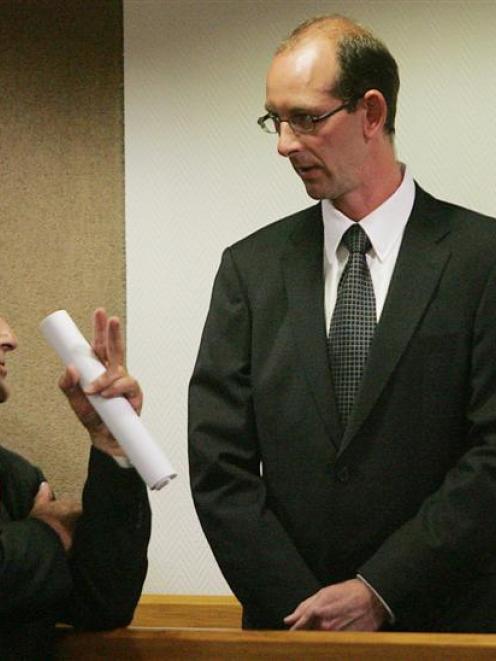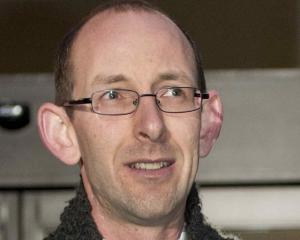
Crown prosecutor Robin Bates detailed the case against David Bain, 36, on the opening day of his Christchurch High Court retrial for the murders of his parents and three siblings in Every Street, in Dunedin's Andersons Bay in 1994.
He said the evidence was circumstantial but strong.
"Circumstantial evidence can often be very compelling," he said.
But defence counsel Michael Reed QC told the jury members they would hear "quite startling evidence" that completely contradicted the Crown's claims that David Bain was the killer.
Mr Bates said the Crown - about 90 witnesses are expected to be called - would show that David Bain killed all five victims.
It would show that his father, Robin Bain, did not kill four members of the family, then commit suicide.
Bain, then a student aged 22, phoned 111 about 7.10am on June 20, 1994, saying that his father was dead.
Police arrived at 7.30am to find him hysterical and wailing "they are all dead" in his bedroom.
They found the body of Robin Bain, shot through the head, with a .22 rifle nearby.
They also found Margaret Bain, 50, killed by a single shot in the head, and daughters Laniet and Arawa, also killed by head wounds.
It was clear from the scene that there had been a significant struggle by Bain's brother Stephen, 14, who received a wound that grazed his scalp and bled profusely.
He was then incapacitated by being strangled with a T-shirt and killed by a second shot.
Mr Bates told the court that Bain had injuries consistent with the struggle in Stephen's room, and had Stephen's blood on his clothing.
Bain told police he had heard Laniet gurgling. This meant he had to be present between the time she was shot through the cheek - causing her incapacitation - and shot in the head.
The scene in the laundry was consistent with Bain trying to destroy evidence by washing his clothing - particularly a green jersey which the crown said he was wearing during the killings, Mr Bates said.
The crown also said a lens from spectacles Bain was wearing was found in Stephen's room. The frame and other lens were found in Bain's room.
The murders were carried out with Bain's rifle, for which he had the trigger lock keys, and his bloody gloves were found in Stephen's bedroom.
It was the crown's case that he had to remove the gloves to clear a misfeed or jam in the rifle.
It also said that Robin - if he planned to commit suicide - would have had no reason to wear gloves to hide his fingerprints.
Mr Bates said that Bain tried to use his paper round as an alibi and had made sure he was seen along the route.
He said evidence would be given of Bain having an intense conversation with a friend six days before the killings.
Bain said he sometimes knew what was going to happen next, and he had a feeling "something horrible" was going to happen.
After the killings, he told the same person that the murders were what he had told her about beforehand.
In his opening statement, Mr Reed said the defence case would be that Robin Bain murdered his wife and children before committing suicide.
There was plenty of evidence to show this, he said, describing the crown case as "absurd".
The crown had skated over the motive for the killings, citing an argument between David and Robin Bain about a chainsaw.
But the defence said Robin's existence - a depressive, who was a school principal, a religious man - was about to be overtaken by allegations of sexual abuse by his daughter Laniet.
"That's what triggered the event."
Mr Reed was very critical of the police investigation. He accused them of not following up inquiries that did not fit their theory.
Evidence had been lost or destroyed since the killings in 1994, and about 15 police officers or investigators had tramped through the crime scene when it was discovered, "knocking into, and moving things".
A scientist had been kept waiting outside for so long that he was unable to pinpoint the time of death of the victims.
No tests had been done for gunshot residue, to see whether Robin Bain had fired the rifle that was found next to his body.
Scientists would say that it was not unusual for people who had fired guns to leave no fingerprints on the weapons.
New forensic evidence would discount some evidence put forward at the first trial, including a piece of skin found in the room where David Bain's brother Stephen had put up a fight before he was killed. The skin was now known not to be David's.
Bloody sockprints on the carpet through the house were now said to be a perfect print for Robin's feet rather than David's.
This showed Robin had been walking around the house rather than being shot from behind a curtain when he entered the lounge, as the crown claimed.
He had been sleeping on a caravan away from the house.
Mr Reed also attacked the crown's claims of David Bain's bloody fingerprints being found on the rifle.
The blood was animal blood, from months earlier when Bain had used it to shoot rabbits.
It was not surprising his fingerprints were on it - it was his gun, said Mr Reed.
The trial, which is expected to last for three months will continue on Monday.
Earlier today, Bain stood alone in the dock of the Christchurch High Court as the five charges were put to him. Dressed in a smart dark suit and outwardly very calm, as he was asked to plead to the five charges, he replied "Not guilty" in a deep firm voice.
Bain campaigner Joe Karam was alongside the dock and leaning on the railing during the jury selection process and Mr Karam's son, Matthew, a lawyer, was seated with Michael Reed QC, Helen Cull and Paul Morten as a fourth member of the defence team.
A jury of seven women and five men has been selected to hear David Bain's High Court retrial in Christchurch for the 1994 murders of his parents and three siblings in their Dunedin home.
The defence challenged three of the jurors, the Crown two, and four were excused, three because of some connection to the case and one on medical grounds.
Because all the public space where prospective jurors would normally be seated in the main high courtroom has been taken over by media, the jury selection took place in the next door courtroom.
In spite of recent speculation about the amount of time likely to be taken to choose 12 jurors for the trial, the jury had been selected and sworn within 20 minutes after Justice Graham Panckhurst spoke to them about the importance of impartiality.




